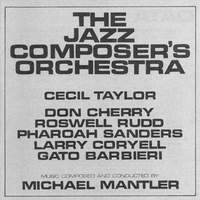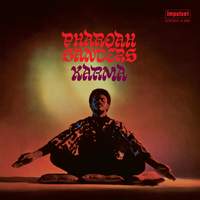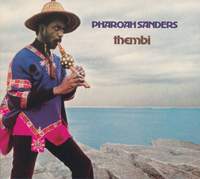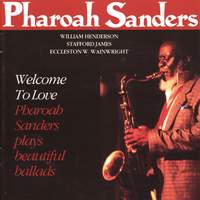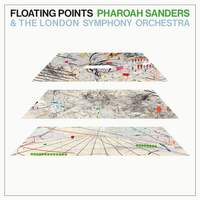Obituary,
Pharoah Sanders (1940-2022)

Saxophonist Pharoah Sanders, a player whose career spanned over six decades, has passed away aged 81. Making a name for himself as one of the most uncompromising and experimental jazz musicians of the sixties, Sanders helped develop the style that has come to be known as Spiritual Jazz, and managed to remain at the cutting edge of contemporary music in the following decades.
Born Farrell Sanders in Little Rock, Arkansas, in 1940, he first learned clarinet and drums, performing in church, before switching to alto saxophone in high school; “I was always trying to figure out what I wanted to do as a career. What I really wanted to do was play the saxophone—that was one of the instruments that I really loved,” he told The New Yorker. “I would rent the school saxophone. You could rent it every day if you wanted to. It wasn’t a great horn. It was sort of beat-up and out of condition. I never owned a saxophone until I finished high school and went to Oakland, California. I had a clarinet, and so I traded that for a new silver tenor saxophone, and that got me started playing the tenor.”
His career began in Oakland, California, where he briefly studied music at Oakland Junior College, but his real education came by performing in clubs in the area, both for black and white audiences, and it was here that he first met John Coltrane. Moving to New York in the early 1960s, he collaborated with Sun Ra, who gave him the nickname “Pharoah”, and by 1964 Sanders had recorded his debut LP Pharoah’s First, for ESP-Disc. In 1965 he was invited to join John Coltrane’s rapidly expanding group, and went on to appear on over a dozen albums in the next two years until Coltrane’s untimely death in 1967. “I couldn’t figure out why he wanted me to play with him, because I didn’t feel like, at the time, that I was ready to play with John Coltrane… Being around him was almost, like, ‘Well, what do you want me to do? I don’t know what I’m supposed to do.’ He always told me, ‘Play.’ That’s what I did.” During these years Sanders came under considerable criticism from the traditional jazz establishment for his overblown, frequently atonal style of playing free jazz. In some ways he stood in as whipping boy for Coltrane, by the critics who resented Coltrane’s seeming rejection of hard-bop, and the modal style of the classic quartet, in favour of free jazz. However history proved Sanders’s detractors wrong, and early masterpieces such as Karma, and Black Unity have stood the test of time brilliantly for their fusing of white-hot free playing with an immensely soulful heart.

As the seventies rolled around Sander’s playing style softened considerably, as his vision of music as a healing force grew, and he developed a knack for spinning out memorable long soaring melodies. With his old bandmate, harpist Alice Coltrane, he became one of the leaders of Spiritual Jazz. He appears on a string Alice Coltrane’s landmark recordings, including A Monastic Trio and the classic Journey in Satchidananda, featuring some unforgettable interplay between Coltrane’s harp and Sanders’ soprano saxophone. Sanders fostered the talents of many of his younger contemporaries through participating in his groups over the years, including Lonnie Liston Smith, Leon Thomas, Norman Connors, Gary Bartz, Stanley Clarke, Idris Muhammad, James Mtume and many more. Although best remembered for his sixties and seventies recordings on Impulse!, Sanders continued to record for many labels throughout the 80s and 90s. He slowed down somewhat after the turn of the century, but made a late career return on the LP Promises, a collaboration with UK electronic producer Floating Points, a beautifully reserved suite of meditations recorded with the London Symphony Orchestra.
Sanders’ legacy can be heard throughout the contemporary music scene, both in and outside of jazz, and stands as a stellar example of an artist who maintained his integrity and remained relevant throughout his career.
Check out some of Pharoah Sanders' most iconic recordings...
At 3:30 the track ‘Preview’ remains one of the most terrifying examples of free jazz ever committed to tape. Sanders’ screams through his horn like the world is about to end, Mantler’s merciless orchestrations for a crack ensemble crushing all in its path.
Available Formats: CD, MP3, FLAC
Karma is arguably Sanders’s A Love Supreme, making a fully rounded suite out of an elegantly simple chant like melody. The influence of Sun Ra is also evident in the cosmic themes and expanded palette, but the result is 100% Sanders.
Available Formats: CD, MP3, FLAC
In contrast to the side-long mantras that he had been working on, Thembi presents a sequence of shorter pieces that allow him to explore a variety of different moods, and experiment with numerous instruments aside from his tenor – including soprano, alto flute, fifes, African bailophone, and assorted small percussion.
Available Formats: MP3, FLAC
A moving sequence of ballads, Welcome to Love shows off Sanders’s soulful playing style.
Available Formats: MP3, FLAC
One of Sanders' final recordings, Promises, is a moving and atmospheric suite made in collaboration with English electronic producer Floating Points (aka Sam Shepherd) and the London Symphony Orchestra. Despite the considerable generational gap between Shepherd and Sanders, the two’s unlikely collaboration was born from a mutual appreciation. An ambient piece in nine movements, Promises is a beautifully spacious record that really benefits from a careful listen as it unfolds.
Available Format: CD


